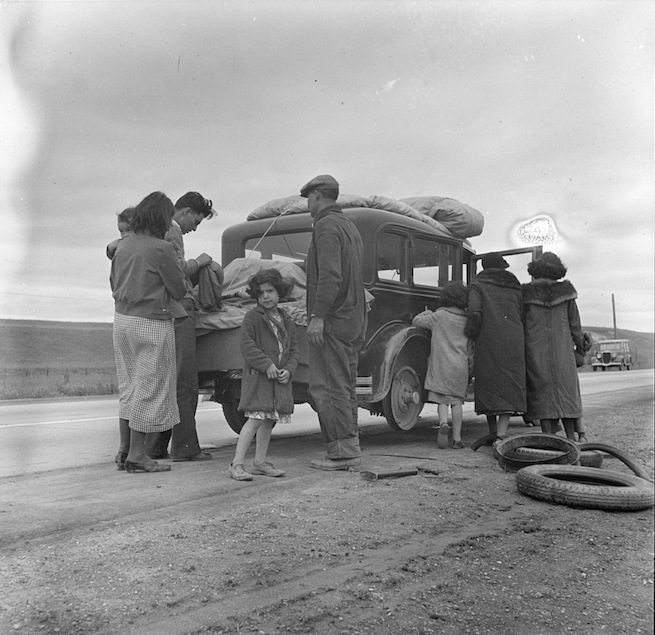
“Repatriation” of Mexican Americans and Mexican nationals continues
During the 1930s, an estimated 400,000 to 1,000,000 Mexican nationals and American citizens of Mexican descent from throughout the United States were deported or “repatriated” to Mexico.
View newspaper articlesDomestic concerns in the United States, including unemployment and national security, combined with prevalent antisemitism and racism, shaped Americans’ responses to Nazism and willingness to aid European Jews. The economic devastation of the Great Depression, combined with isolationist attitudes and deeply held prejudices against immigrants, limited Americans’ willingness to welcome refugees. Many issues that the American public perceived as having a critical impact on their livelihoods, security, and core values vied for public attention during this time and affected the manner in which Americans responded to events at home and abroad.
In 1924, the Johnson Reed Immigration Act severely limited immigration to the United States and was based on eugenic principles and the goal of keeping American white and Protestant. In addition to opposition to immigrants from China and eastern and southern Europe, a variety of interest groups, including small farmers, labor unions, eugenicists, and racists had called for restrictions on Mexican immigration. Their arguments focused primarily on competition for jobs and the cost of public assistance for indigents. These arguments intensified with the beginning of the Great Depression in 1929 which exacerbated pervasive nativist, xenophobic, racist, and antisemitic attitudes.
Congressman Martin Dies argued in the Chicago Herald-Examiner that the "large alien population is the basic cause of unemployment.” Dies was bolstered by independent groups such as the American Federation of Labor (AFL) and the National Club of America for Americans who supported deportation of Mexican immigrants as a means to free up jobs for US citizens. The latter group urged Americans to pressure the government into deporting Mexicans.
In opposition were a small number of groups like the National Catholic Welfare Conference which estimated in a study of El Paso, Texas, that the deportation of parents who were non-citizens would incur costs beyond those associated with roundup and deportation, because the children and wives of deportees left behind in the United States would become public charges.
During the 1930s, an estimated 400,000 to 1,000,000 Mexican nationals and American citizens of Mexican descent from throughout the United States were deported or “repatriated” to Mexico through both a formal campaign of the federal government and by private industries as well as local and state authorities. Conservatively, it is estimated that 60 percent of the deportees were US citizens of Mexican descent.
Facing bleak job prospects, public harassment, intimidation and even threats of violence, large numbers of Mexican immigrants voluntarily returned to Mexico, often with encouragement from the Mexican government. Forced deportations occurred as well. Los Angeles had the largest population of Mexicans outside of Mexico, and government officials there organized a systematic deportation campaign. Raids were significant in scope, especially in 1931, when Federal officials, county deputy sheriffs, and city police engaged in mass arrest operations. Deportation actions were announced with publicity releases, and authorities raided public places -- sometimes blocking off entire neighborhoods -- herding those arrested onto trains or buses, often without checking for legal documentation. The La Placita raid of February 26, 1931 in Los Angeles was probably the most significant single event underscoring the brutal terror of the 1930s repatriation deportations.
While most deportation campaigns peaked during the height of the Great Depression in the early 1930s, "repatriation" efforts continued in localities throughout the United States up until the outbreak of World War II. For example, as one action among many between July 1933 and May 1934, Los Angeles “repatriated” 800 people of Mexican descent on April 25, 1934.
Mexican and Mexican American men, women, and children underwent a horrific adjustment to life in Mexico and endured countless hardships. Many retained their American identity and citizenship, and they later returned to the United States. Some survivors of repatriation arrived in time for World War II, in which some of them fought and were eyewitnesses to the evidence of the Holocaust. Former deportees worked in factories and farms that were critical to the war effort and even served in the US armed forces to defend the nation that had unconstitutionally deported them.
[The museum is grateful to Dr. Francisco Balderrama for the historical review and contributions to this module.]
Learn More about this Historical Event
- Anthony Acevedo, a Mexican-American deportee, and US Army medic held POW at Berga (Americans and the Holocaust online exhibition)
- America’s Forgotten History of Mexican-American ‘Repatriation’ (NPR interview with Francisco Balderrama)
- Mexican Americans and Repatriation (Texas State Historical Association)
- Aqui Estamos y No Nos Vamos / Fighting Mexican Removal Since the 1930s (Boyle Heights Museum)
- INS Records for 1930s Mexican Repatriation (U.S. Citizenship and Immigration Services)
- Texas’ Mass Mexican Deportation (Think; KERA interview with Melita M. Garza)
Search tips
These dates and keywords are associated with this historical event.